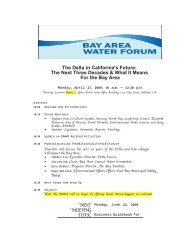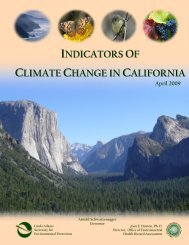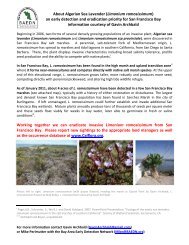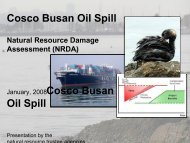Bird Species and Climate Change: The Global Status Report - WWF
Bird Species and Climate Change: The Global Status Report - WWF
Bird Species and Climate Change: The Global Status Report - WWF
Create successful ePaper yourself
Turn your PDF publications into a flip-book with our unique Google optimized e-Paper software.
stronger the risk. With a global meansurface temperature increase of 1-2°Cabove pre-industrial levels, manyunique <strong>and</strong> threatened ecologicalsystems will be at risk <strong>and</strong> numerousspecies will face extinction (Noble et al.,2005; van Vliet <strong>and</strong> Leemans, 2006).Risk is dependent on the species. <strong>The</strong>golden bowerbird, like many otherbird species in the Wet Tropics ofAustralia’s northeast, is particularlyvulnerable. Its suitable habitat woulddecrease 63 per cent with less than 1°Cof future warming (Hilbert et al., 2004),illustrating why this zone’s climatescenario has been called “an impendingenvironmental catastrophe” by Williamset al. (2003).Among particularly vulnerable groups-- migratory, Arctic, Antarctic, isl<strong>and</strong>,wetl<strong>and</strong>, mountain <strong>and</strong> seabirds --heightened impacts are expected. <strong>The</strong>threat of climate change to migratorybirds is equal to the sum of all otherhuman-caused threats combined(DEFRA, 2005) with 84 per cent ofmigratory bird species 2 facing sometype of climate change threat. Forexample, the Arctic-breeding redbreastedgoose, already globallyvulnerable, is expected to lose 99 percent of its tundra breeding habitat dueto climate change (Zöckler <strong>and</strong> Lysenko,2000). <strong>Bird</strong>s that are habitat specialistsare at higher risk than generalists(Huntley et al., 2006; RSPB/<strong>WWF</strong> 2003).<strong>Bird</strong>s breeding in arid environments(Bolger et al., 2005) <strong>and</strong> those with lowpopulation numbers, poor dispersalability, already poor conservationstatus, <strong>and</strong> restricted or patchy habitatsor limited climatic ranges are also atelevated risk from climate change (Reidet al., 2005; Huntley et al, 2006).<strong>The</strong> overall extinction risk of climatechange to birds is still being quantified.However, first-cut estimates present thepossibility of the extinction of more thana third of European bird species undera maximum (>2.0°C) climate changescenario, if birds cannot shift to newclimatically suitable ranges (Thomas etal., 2004). Indeed their capacity to shiftis subject to considerable uncertaintygiven Europe’s heavily modifiedl<strong>and</strong>scape (Huntley et al., 2006). Onec<strong>and</strong>idate for extinction is the Scottishcrossbill, expected to lose 100 per centof its current habitat (Thomas et al.,2004b).In the Australian Wet Tropics bioregion,mid-range climate change is predictedto threaten almost three quarters ofrainforest birds there with extinction inthe next 100 years (Shoo et al., 2005a).Table 1 provides estimates of birdextinction rates in four regions aroundthe world, from Thomas et al. (2004).However, many current projectionsof climate impacts, including thoseof the Intergovernmental Panel on<strong>Climate</strong> <strong>Change</strong> (IPCC), are likely to beunderestimates (van Vliet <strong>and</strong> Leemans,2006; Pounds <strong>and</strong> Puschendorf, 2004;Thomas et al., 2004). Most researchconsiders only the direct effectstemperature or precipitation will havein shifting or contracting climaticallysuitableranges. Limiting the numberof climate variables used potentiallyunderestimates the risk of key climatic2 Those birds listed with the Convention on the Conservation of Migratory <strong>Species</strong> (CMS).<strong>Bird</strong> <strong>Species</strong> <strong>and</strong> <strong>Climate</strong> <strong>Change</strong>: <strong>The</strong> <strong>Global</strong> <strong>Status</strong> <strong>Report</strong><strong>Climate</strong> Risk






